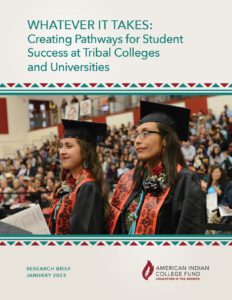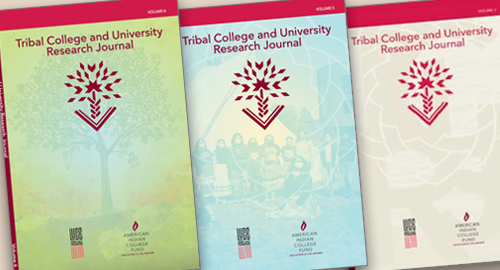American Indian College Fund Conducts Unique Student Support Services Research at Tribal Colleges and Universities
The study examines how TCUs define and achieve student success.
April18, 2023, Denver, Colo. — The American Indian College Fund (College Fund) is releasing three briefs with findings from a three-part research project on tribal colleges and universities it conducted in 2020-21. The focus of the research includes tribal college and university (TCU) student support services, program development and review, and sustainability. TCUs are unique higher learning institutions located on or near Indian reservations with the dual mission to provide tribal citizens higher education opportunities while ensuring that degree programs, assessment, and student support structures are based in community and culture.

Please click image to download your copy of WHATEVER IT TAKES: Creating Pathways for Student Success at Tribal Colleges and Universities
Unlike other higher education institutions, TCUs were chartered by tribal nations as an act of self-determination in higher education and to support Native nation-building. They play a critical role for their students and tribal communities. Despite their importance, little research has been done about TCUs, and instead research focuses on the Indigenous student experience at predominantly white institutions. The College Fund partnered with a selection of TCUs to begin filling this data gap and to offer insights into TCU practices and how to best support them.
“Whatever It Takes: Creating Pathways for Student Success at Tribal Colleges and Universities” is one of three briefs released with this goal in mind. The study and brief, funded by a grant from the Lumina Foundation, are the result of a collaboration between the College Fund and five TCUs. The College Fund conducted interviews with institutional leaders, faculty, and staff; reviewed available literature; and reviewed each institution’s strategic plan during the project. The study examined how student success is defined at TCUs and the programs and activities TCUs implemented to support their students.
The brief notes the TCUs involved provide support services that are holistic, tailored, culturally based, family-centered, and community-focused. The brief further noted that when students at tribal colleges and universities are fully supported, they not only gain useful skills and knowledge but also help revitalize tribal cultures and languages and strengthen tribal economies.
Study participants included 34 TCU leaders, faculty, and staff members from Diné College, Navajo Technical University, Nueta Hidatsa Sahnish College, Turtle Mountain Community College, and United Tribes Technical College (UTTC). Participants discussed student support programs, resources, and initiatives at their college. While no one definition of student success was identified, it was made clear that the standard criteria for student success, i.e. enrollment, retention, and degree completion, were not adequate for rating TCU student success. Factors such as gaining cultural knowledge, positively impacting the community, and meeting individual rather than institutional goals were also important measures of student success. Participants in the study also identified three unique TCU characteristics they believe contribute to student success: the familial environment at TCUs, the physical campus designs influenced by traditional philosophies and teachings, and the dual mission of TCUs that include academic, cultural, and community components.
The brief is divided into sections on the three major themes of student support services at TCUs, including outreach, retention, and post-graduation, and their respective challenges. The study also found that housing, childcare, and transportation were the top three barriers for student success at TCUs, which is why holistic, family-centered, and community- focused approaches to student support are critical. The brief concludes with suggestions for improving current student support services with collaboration across departments, housing all services in a single physical location, obtaining additional funding to hire full- time advisors, and creating online programs that engage tribal citizens who may be currently living outside of their tribal communities.
To read or download a copy of “Whatever It Takes: Creating Pathways for Student Success at Tribal Colleges and Universities” please visit https://resources.collegefund.org/file/whatever-it-takes-creating-pathways-for-student-success-at-tribal-colleges-and-universities/
Leander R. McDonald, President of United Tribes Technical College, said, “Studies focused on TCUs’ culturally based student success initiatives are critical to the sustainability of tribal institutions of higher education. Reports, white papers, or peer reviewed journal articles are valuable resources for those seeking to advance student achievement for their students who perceive our world through a Native lens.”
Cheryl Crazy Bull, President and CEO of the American Indian College Fund, said, “Thousands of Indigenous and rural students benefit from the commitment of TCUs to providing quality academic and vocational programs. As a long-time educator, I reflected on the appropriateness of the title of this report on student success at TCUs, “Whatever It Takes,” because that is what students experience. They are the center of focus as members of the community in the classroom, with student supports including financial aid. They bring their knowledge and identity to the institution and the institution reciprocates—honoring student knowledge and identity and integrating students’ experiences into the success supports they need.”
About the American Indian College Fund — The American Indian College Fund has been the nation’s largest charity supporting Native higher education for 33 years. The College Fund believes “Education is the answer” and provided $14.45 million in scholarships and other direct student support to American Indian students in 2021-22. Since its founding in 1989 the College Fund has provided more than $284 million in scholarships, programs, community, and tribal college support. The College Fund also supports a variety of academic and support programs at the nation’s 35 accredited tribal colleges and universities, which are located on or near Indian reservations, ensuring students have the tools to graduate and succeed in their careers. The College Fund consistently receives top ratings from independent charity evaluators and is one of the nation’s top 100 charities named to the Better Business Bureau’s Wise Giving Alliance. For more information about the American Indian College Fund, please visit www.collegefund.org.
Journalists—The American Indian College Fund does not use the acronym AICF. On second reference, please use the College Fund.










